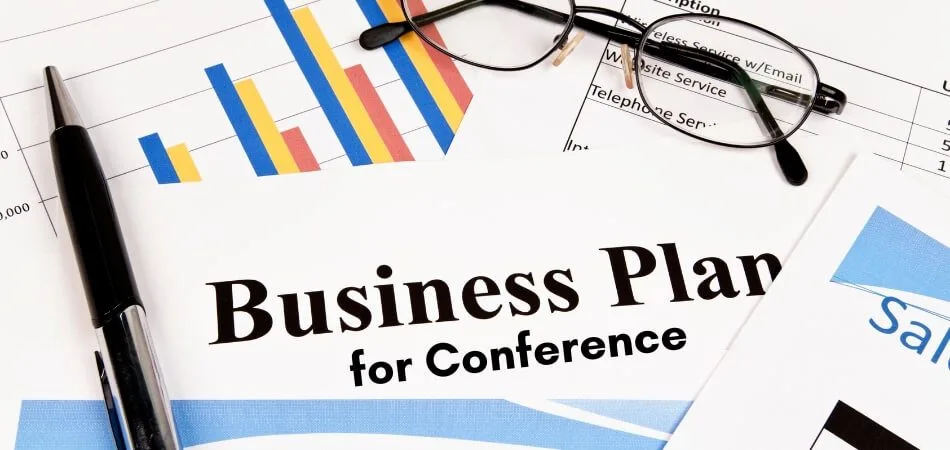Conferences can be crucial in bringing together like-minded professionals and encouraging industry advancements. However, the success of such events hinges on meticulous planning and execution. But how to write a business plan for a conference?
A detailed plan should start by defining the event’s objectives, target audience, and central theme. It must include a detailed budget, identify funding sources, select an appropriate venue, and outline a detailed schedule. Additionally, selecting knowledgeable speakers, devising effective marketing strategies, establishing revenue streams, and preparing backup plans are key components.
Furthermore, analyzing competitors and setting clear success metrics for post-event analysis are essential steps. Stay with us as we dig deeper into each of these aspects in the following sections of our article.
What is a Business Plan for a Conference and How Does It Work?
A business plan for a conference outlines the roadmap for organizing and hosting an event. It includes goals, budget, timeline, target audience, and key content areas. This strategic document guides all decisions and actions, ensuring the conference meets its objectives effectively and efficiently.
In most cases, the plan is developed by a core group of organizers, as well as sponsors, speakers, and attendees. It covers logistical arrangements, marketing strategies, and content curation, focusing on creating a cohesive and engaging experience for all participants.
The success of this plan often depends on the effective functioning of conference planning committees. These committees are tasked with specific roles, from budgeting to programming, and work together to bring the vision of the conference to life. Their insights and decisions shape the event, ensuring it aligns with the strategic goals outlined in the business plan.
Qualifications You Will Need to Write a Conference Business Plan
Writing a conference business plan demands a unique set of skills and knowledge. It’s not just about having a great idea but also about translating that idea into a feasible, well-organized event. The right qualifications are essential for creating a successful and impactful conference.
- Strategic Planning Skills: Effective planning is crucial for setting goals and outlining steps to achieve them. This skill ensures a well-structured and realistic plan.
- Financial knowledge: Knowing budgeting, cost analysis, and revenue generation is key. It’s essential for managing the financial aspects of the conference effectively.
- Market Research Ability: Knowledge of market research methods is vital. It helps in understanding the target audience and the competitive environment.
- Marketing and Promotion Expertise: Skills in marketing are important for attracting attendees and sponsors. This involves creating and executing a comprehensive marketing strategy.
- Organizational Skills: Strong organizational abilities ensure that every aspect of the conference is coordinated efficiently. This includes managing timelines, resources, and personnel.
- Analytical Thinking: The ability to analyze data and feedback is crucial. It helps measure conference success and making improvements for future events.
These qualifications provide an individual with the necessary tools to write an effective and effective conference business plan. These skills ensure not only the successful execution of the event but also its long-term sustainability and impact.
How to Write a Business Plan for a Conference?
A detailed plan for an event requires careful planning and serious consideration. By carefully understanding your event’s unique needs and aligning them with your available resources and goals, you can develop a comprehensive plan. Here is a step-by-step guide to help you in writing it effectively.
Step 1: Define Your Objectives and Themes
Begin by setting specific, measurable objectives and deciding on a theme that resonates with your target audience. As you develop your business plan for a conference, you should consider objectives like networking opportunities, educational goals, or showcasing new industry trends. The theme should be engaging and relevant, providing a common theme that connects all the conference elements together.
Step 2: Identify Your Target Audience
Understanding your audience is key to tailoring your conference’s content and marketing. Consider factors like industry, job level, geographical location, and what they seek to gain from attending. This insight helps in creating targeted marketing campaigns and a conference agenda that meets their expectations.
Step 3: Develop a Detailed Budget
Prepare a detailed budget that covers every financial aspect of the conference, including venue rental, speaker fees, marketing costs, and operational expenses. It’s equally important to identify potential revenue streams like ticket sales, sponsorships, and merchandise. This step ensures financial feasibility and guides your pricing strategy.
Step 4: Choose a Suitable Venue and Plan Logistics
Selecting the right venue involves considering size, location, accessibility, and features. It should align with your conference’s tone and size. Equally important is logistics planning, which covers aspects like transportation, hotel options for attendees, technology needs, and meal services.
Step 5: Marketing and Promotion Strategies
Developing an effective marketing plan is crucial for attracting the right audience and sponsors. Utilize a mix of digital and traditional marketing methods, leveraging social media, email campaigns, industry publications, and partner networks. Creating engaging content that highlights the value and uniqueness of your conference can significantly boost interest and attendance.
Step 6: Analyze and Improve
After the event, make a detailed review using surveys, feedback forms, and financial analysis. Assess the conference’s success in meeting its objectives, attendee satisfaction, and overall financial performance. This feedback is necessary for understanding what worked well and what areas need improvement for future events.
Writing a business plan for a conference is about more than just logistics and marketing. It’s about creating an event that delivers value to its attendees and meets its set objectives, while also laying the groundwork for future success through careful analysis and feedback.
Common Mistakes to Avoid While Writing a Conference Business Plan
The process of writing a conference business plan can be challenging, and even seasoned planners can make mistakes. Avoiding these common mistakes is crucial for your event’s success. Awareness of these errors can significantly improve your conference planning and outcome.
- Underestimating Costs: Failing to accurately estimate costs can lead to budget shortfalls. Always include contingency funds for unexpected expenses in your financial planning.
- Ignoring Target Audience Needs: Not adjusting the conference to the specific interests and needs of your audience can reduce engagement. Identify and respond to your audience for maximum impact.
- Inadequate Marketing Efforts: Insufficient marketing can result in low attendance. Use diverse channels and targeted messages to effectively reach your potential attendees.
- Overlooking Venue Logistics: Choosing a venue without considering logistical aspects can lead to operational challenges. Ensure the venue suits your size, technical requirements, and accessibility needs.
- Neglecting Speaker Quality: Compromising speaker quality can affect the conference’s value. Invest in knowledgeable and engaging speakers who align with your theme and objectives.
- Not Planning for Backup: Failing to have a backup plan for unforeseen issues can cause major disruptions. Always prepare for scenarios like speaker cancellations or technical failures.
Being mindful of these common errors can greatly increase the effectiveness of your conference business plan. Proper planning, audience needs, and backup measures are key elements in creating a successful and memorable conference.
Is It Worthwhile to Create a Business Plan for a Conference?
Yes, creating a business plan for a conference is worthwhile. A carefully designed plan provides a clear roadmap, ensuring every aspect of the event aligns with your objectives. It helps in organizing resources, managing budgets, and setting realistic timelines, all of which contribute to a successful outcome.
By developing a detailed business plan, you also identify potential challenges early on. This allows you to deal with them early, minimizing risks and maximizing opportunities. The plan serves as a guide, helping you stay focused on the goals and priorities that matter most.
A carefully prepared plan also makes adding value to conferences much easier. It ensures that every element, from speakers to networking opportunities, maximizes the overall experience for attendees, making the conference more impactful and memorable.
Taking the time to develop a business plan for your conference is an essential step that you need to take for it to succeed. It not only organizes your event but also improves its quality, making it a worthwhile investment in your time and resources.
Frequently Asked Questions
Here are some frequently asked questions that dive deeper into the process of creating an effective business plan for a conference. These questions address specific concerns that may arise during the planning and execution stages.
What is the Importance of Defining a Conference Theme?
A conference theme provides an overall narrative that connects all aspects of the event. It helps in selecting relevant speakers, topics, and promotional strategies. A well-chosen theme ensures consistency and relevance, improving the overall attendee experience.
How Do You Secure Funding for a Conference?
The process of securing funding for a conference involves exploring various revenue sources, such as sponsorships, ticket sales, and partnerships. Presenting a detailed budget and demonstrating the event’s value to potential sponsors is essential. Offering multiple sponsorship packages can also attract a wide range of contributors.
How Should You Measure the Success of a Conference?
It is important to analyze both qualitative and quantitative data when measuring the success of a conference. This includes attendee satisfaction surveys, social media engagement, and financial performance. Post-event analysis helps identify strengths and areas for improvement, guiding the planning of future conferences.
How Can You Effectively Promote a Conference?
Marketing a conference effectively requires a multi-channel strategy. Utilize social media, email campaigns, and industry publications to reach your target audience. Engaging content and early bird promotions can boost registrations. Collaborating with influencers and industry leaders can also enhance visibility.
What Role Does Technology Play in Conference Planning?
A conference’s technical aspects can simplify planning, improve attendee engagement, and facilitate virtual participation. Tools like event management software, mobile apps, and live streaming can improve the planning process and create a smooth experience for attendees.
Bottom Line
The road to understanding how to write a business plan for a conference involves going through several critical steps. These include setting clear objectives and themes, identifying the target audience, creating a detailed budget, and choosing the right venue and logistics.
Additionally, the development of strong marketing strategies and a process for continuous monitoring and improvement are essential. The skills needed for this task span strategic planning, financial acumen, market research, marketing expertise, organizational skills, and analytical thinking.
Common mistakes such as underestimating costs and overlooking audience needs must be avoided. Creating a business plan for a conference is a valuable process that provides a structured framework for success, ensuring that the event is not only financially stable but also impactful and memorable for all participants.








